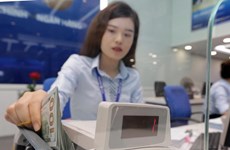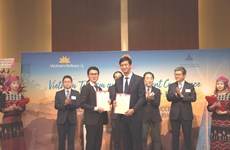National economy recovers, but not solid yet: Government
The national economy has gradually
recovered but it has yet to secure a firm foothold, the Government
commented at its November meeting in Hanoi on December 1.
The national economy has gradually
recovered but it has yet to secure a firm foothold, the Government
commented at its November meeting in Hanoi on December 1.
Over the last 11 months, the country has overcome numerous difficulties to succeed in avoiding economic decline and controlling inflation to create a favourable environment for socio-economic development, the Government members agreed.
However, they pointed out that trade deficit still remains high, constituting in 10.42 billion USD in the reviewed period or equivalent to 20.3 percent of export earnings. The total credit balance also surged.
Additionally, the regulation of exchange rates and the foreign currency market was not really flexible, engaged in considerable budget overspending, and the loose monetary policy threatened to bring back inflation.
At this meeting, Government members agreed upon major goals set for 2010, the final year of the country’s 2006-2010 Socio-economic Development Plan and 2001-2010 Socio-economic Development Strategy.
They have set out to register an economic growth rate higher than that in 2009—this in order to increase the stability of the macro-economy, improve the quality of growth, prevent the recurrence of high inflation, enhance the ability to ensure social welfare, proactively integrate into the global economy and improve the effectiveness of international economic cooperation, maintain political stability and social order, and ensure the implementation of defence and security requirements.
To this end, the Government outlined nine key groups of solutions, including speeding up improvements in the investment environment, boosting production, commerce and services, stepping up restructuring, promoting economic recovery, managing the trade deficit effectively, mobilizing and efficiently using investment resources for development, and implementing a financial and monetary policy that will strengthen the stability of the macro-economy and prevent high inflation.
At the meeting, PM Dung gave opinions on the implementation of an interest rate subsidy for bank loans in Vietnamese Dong to organizations and individuals and for loans for the purchase of machinery and equipment for agricultural production and construction materials in rural areas.
Accordingly, the provision of loan interest rate subsidies as stipulated at Decision 131/QD-TTg will stop by the end of this year.
The loan interest rate subsidy mechanism applied for long and medium-term loans as detailed in Decisions 443/QD-TTg and 497/QD-TTg will continue to be implemented, but with a smaller pool of beneficiaries and lower levels of subsidization.
PM Dung asked the ministries, sectors, and localities to strictly control the import of raw materials and commodities, make prompt intervention into the prices of gold, foreign currencies and stocks, and manage the prices of essential commodities, especially now as the nation’s traditional Lunar New Year (Tet) festival is approaching./.
Over the last 11 months, the country has overcome numerous difficulties to succeed in avoiding economic decline and controlling inflation to create a favourable environment for socio-economic development, the Government members agreed.
However, they pointed out that trade deficit still remains high, constituting in 10.42 billion USD in the reviewed period or equivalent to 20.3 percent of export earnings. The total credit balance also surged.
Additionally, the regulation of exchange rates and the foreign currency market was not really flexible, engaged in considerable budget overspending, and the loose monetary policy threatened to bring back inflation.
At this meeting, Government members agreed upon major goals set for 2010, the final year of the country’s 2006-2010 Socio-economic Development Plan and 2001-2010 Socio-economic Development Strategy.
They have set out to register an economic growth rate higher than that in 2009—this in order to increase the stability of the macro-economy, improve the quality of growth, prevent the recurrence of high inflation, enhance the ability to ensure social welfare, proactively integrate into the global economy and improve the effectiveness of international economic cooperation, maintain political stability and social order, and ensure the implementation of defence and security requirements.
To this end, the Government outlined nine key groups of solutions, including speeding up improvements in the investment environment, boosting production, commerce and services, stepping up restructuring, promoting economic recovery, managing the trade deficit effectively, mobilizing and efficiently using investment resources for development, and implementing a financial and monetary policy that will strengthen the stability of the macro-economy and prevent high inflation.
At the meeting, PM Dung gave opinions on the implementation of an interest rate subsidy for bank loans in Vietnamese Dong to organizations and individuals and for loans for the purchase of machinery and equipment for agricultural production and construction materials in rural areas.
Accordingly, the provision of loan interest rate subsidies as stipulated at Decision 131/QD-TTg will stop by the end of this year.
The loan interest rate subsidy mechanism applied for long and medium-term loans as detailed in Decisions 443/QD-TTg and 497/QD-TTg will continue to be implemented, but with a smaller pool of beneficiaries and lower levels of subsidization.
PM Dung asked the ministries, sectors, and localities to strictly control the import of raw materials and commodities, make prompt intervention into the prices of gold, foreign currencies and stocks, and manage the prices of essential commodities, especially now as the nation’s traditional Lunar New Year (Tet) festival is approaching./.













